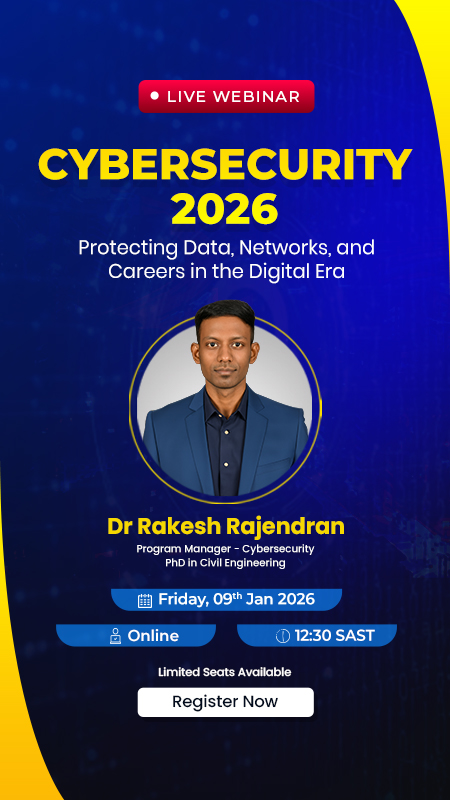What To Expect From A Cyber Security Course Syllabus?
In a world increasingly interconnected through digital landscapes, the importance of cyber security has surged to the forefront of global concerns.
Enroling in a cyber security course is a pivotal step for those seeking to venture into safeguarding digital environments.
This article sets the stage for unravelling the intricacies of a cyber security course syllabus, offering a glimpse into the diverse terrain of topics, practical applications, and certifications that await aspiring cyber security professionals.
What is a Cyber Security Course?
A Cyber security course is an educational programme that provides individuals with the knowledge, skills, and practical techniques necessary to secure and defend computer systems, networks, and digital information from cyber threats and attacks. These courses are designed to cover a broad spectrum of topics within the field of cyber security, ranging from foundational principles to advanced techniques.
Cyber security courses cater to individuals with varying levels of expertise, from beginners seeking foundational knowledge to experienced professionals looking to deepen their skills. These courses may be offered by educational institutions, cyber security training providers, or through online platforms, providing flexibility for learners to acquire essential cyber security competencies.
Unveiling the Essentials: A Cyber Security Course Syllabus Deconstructed
Cyber security has become a critical concern in today’s digital landscape. As the threats to online security continue to evolve, the need for skilled professionals in this field has never been greater.
Enroling in a cyber security course promises to equip individuals with the knowledge and skills to combat these evolving threats.
Cyber security course syllabus mainly includes:
Understanding the Fundamentals
- A comprehensive cyber security course syllabus will begin with exploring the fundamental principles of cyber security.
- This may include an in-depth examination of the various types of cyber-attacks, the anatomy of malware, and the principles of encryption.
- By delving into these foundational concepts, students can develop a solid understanding of the underlying mechanisms of cyber security.
Navigating the World of Networking
- In the realm of cyber security, understanding network security is paramount.
- A robust syllabus will often include a detailed exploration of networking concepts, such as firewalls, intrusion detection systems, and virtual private networks.
- Students can expect to understand how networks function and the methods to protect them from external threats.
Embracing the Art of Ethical Hacking
- Ethical hacking has emerged as a vital component of cyber security.
- A syllabus designed to provide a comprehensive education in cyber security will often include modules dedicated to ethical hacking.
- This may involve hands-on training in penetration testing, vulnerability assessment, and the methodologies employed by ethical hackers to identify and rectify security vulnerabilities.
Delving into Cryptography
- Cryptography forms the backbone of secure communication and data protection.
- A well-crafted syllabus will incorporate a thorough examination of cryptographic principles, cryptographic algorithms, and their various applications in the realm of cyber security.
- Students can anticipate learning about encryption standards, digital signatures, and cryptographic protocols.
Exploring Security Management
- Understanding the managerial aspect of cyber security is crucial for aspiring professionals.
- A proficient syllabus will cover security management principles, risk assessment, and incident response.
- This segment equips students with the knowledge required to formulate effective security policies, assess potential threats, and methodically respond to security incidents.
Grasping Compliance and Legal Aspects
- In the context of cyber security, compliance with legal regulations and industry standards is of paramount importance.
- A well-rounded syllabus will provide insights into compliance requirements, data protection laws, and the regulatory frameworks that govern cyber security practices.
- Students can expect to understand cyber security’s legal and ethical implications in a professional setting.
Thus, enroling in a cyber security course promises to be a transformative journey that equips individuals with the expertise to safeguard digital assets from potential threats. By understanding the components of a comprehensive cyber security course syllabus, aspiring professionals can embark on their educational journey with clarity and purpose, ready to tackle the challenges of the dynamic cyber security landscape.

Conclusion
As we conclude our exploration of what to expect from a cyber security course syllabus, it becomes evident that the journey into cyber security is fascinating.
From mastering network security’s intricacies to deciphering ethical hacking, the syllabus serves as a roadmap through a landscape of ever-evolving threats and solutions.
Armed with theoretical knowledge, hands-on experiences, and industry certifications, graduates of cyber security courses emerge prepared to navigate the digital frontier and fortify the defences against cyber adversaries.
The syllabus, a compass in this transformative journey, propels learners into the heart of cyber security expertise, ensuring a robust foundation for the challenges.
Stay tuned with Digital Regenesys’ online cyber security course, syllabus, course structure, course duration and more.
FAQs on What to Expect from a Cyber Security Course Syllabus?
What topics are typically covered in a Cyber security course syllabus?
Cyber security courses often cover various topics, including network security, cryptography, ethical hacking, incident response, risk management, and compliance.
Is programming knowledge required for a Cyber security course?
While some courses may involve programming aspects, many introductory cyber security courses do not require advanced programming skills. Basic knowledge of scripting languages (e.g., Python) can be beneficial.
Are there specific prerequisites for enroling in a Cyber security course?
Prerequisites can vary, but foundational knowledge in computer science, networking, or information technology is often recommended. Some advanced courses may have specific prerequisites.
Can individuals with non-technical backgrounds enrol in a Cyber security course?
Yes, some introductory cyber security courses are designed for individuals with non-technical backgrounds. However, a basic understanding of computer systems and networks is typically beneficial.
Are there hands-on practical components in a cyber security course?
Many cyber security courses include hands-on labs and practical exercises. These components allow students to apply theoretical knowledge in simulated environments and gain practical skills.













